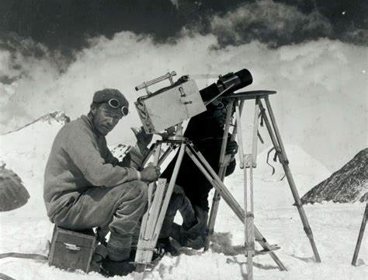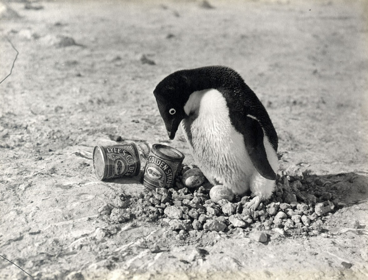Since its founding in 1830, the Royal Geographical Society - latterly the Royal Geographical Society (with the Institute of British Geographers) - has administered awards to recognise excellence in various aspects of geography. Through these medals and awards we can trace a particular history of the discipline - one that the Society itself was keen to tell, through the individuals it deemed worthy of recognition.
This resource provides context and further information for tracing that history through the Society’s medal recipients, all the way back to James Lander in 1832. Through these, we can see who achieved recognition from the Society for their endeavours and who did not. We can also see the ways in which both geography and the Society have changed over time, particularly in what they have been recognised for and the greater diversity of those recognised.
Background of each award
Gold Medal
Two Gold Medals are awarded annually: the Founder's Medal and the Patron's Medal. They are of equal standing and are the most prestigious of the Society's awards. The Gold Medals are given for the encouragement and promotion of geographical science and discovery. Royal approval is required before an award can be made. This Royal approval has been given since 1832, first as a single award of a Royal Premium, and since 1839 as the Founder’s and Patron’s Medals.
Victoria Medal
The Victoria Medal is awarded "for conspicuous merit in research in geography" and has been given since 1902, in honour of the late Queen Victoria. Up until then, the Society's Patron's Medal had alternatively been known as the 'Victoria Medal', and the new medal resembled its original design.
Busk Medal
The Busk Medal is named after Sir Douglas Laird Busk (1906-1990), who worked as a diplomat in Iran, Hungary, South Africa, Japan, Turkey and Iraq before serving as Ambassador to Ethiopia, Finland and Venezuela. Following this, Sir Douglas served as Honorary Vice President of the Society. The Busk Medal was established in 1975. It is given for conservation research or for fieldwork abroad in geography or in a geographical aspect of an allied science.
Cherry Kearton Medal and Award
The Cherry Kearton Medal and Award is an honour bestowed on "a traveller concerned with the study or practice of natural history, with a preference for those with an interest in nature photography, art or cinematography". It is named for nature photographer Cherry Kearton (1871–1941) and was launched in 1967 at the request of his widow.
Murchison Award
The Murchison Award, also referred to as the Murchison Grant, was first given in 1882. It is now awarded for "publications judged to have contributed most to geographical science in preceding recent years". It is named after the Scottish Geologist Sir Roderick Murchison (1792–1871), a Scottish geologist. Murchison was one of the founders of the Society in 1830 and served as President of the Society from 1843–1845, 1851–1853, 1856–1859 and 1862–1871.
Back Award
The Back Award, also referred to as the Back Grant, was first given in 1882. It is now given for "applied or scientific geographical studies which make an outstanding contribution to the development of national or international public policy". It is named after the Arctic explorer Admiral Sir George Back (1796–1878). Back received the Society’s Royal Medal in 1835 and joined the Society as Fellow in 1836. He went on to serve on the Society's Council and was Vice President of the Society for seven years.
Cuthbert Peek Award
This is named after Cuthbert Edgar Peek (1855–1901) who travelled in Iceland, Australia and New Zealand. He studied hot springs and was an observer on the Transit of Venus Expedition in 1882. Today the Cuthbert Peek Award is given to those who "advance geographical knowledge of human impact on the environment through the application of contemporary methods, including those of earth observation and mapping".
Gill Memorial Award
Captain William J. Gill RE (1843–1882) travelled and surveyed in Asia, including expeditions in Central Asia and Persia, and through China and eastern Tibet to Myanmar. He was awarded a Gold Medal in 1879 for his work during his expeditions. First awarded in the early 1880s (probably 1884), the Gill Memorial Award was originally awarded to deserving scientific travellers. Now, the award is given for the "encouragement of geographical research in early career researchers who have shown great potential".
Ness Award
The Ness Award is an annual award to recognise those who have "successfully popularised geography and the wider understanding of our world and its environments". It was established in 1953 and named after Mrs Patrick Ness (1881–1962). Ness travelled extensively, particularly in Africa, and published her experiences. She also made donations that supported expeditions and was the first woman to be elected to the Society's Council in 1930.
Steers Dissertation Prize
First awarded in 1987, the Steers Prize is named after Professor James Alfred Steers (1899–1987) a coastal geomorphologist and conservationist. The award is made for the best undergraduate dissertation in a UK geography department. Steers was chair of geography at the University of Cambridge between 1949 and 1966. He was elected an RGS fellow in 1918 and was Vice president of the RGS 1959-63 and 1967-72. He was awarded the Victoria medal in 1960 ‘for research in coastal geomorphology.’
Area Prize
The Area Prize was first awarded in 2001 and is given in for the best-published article in the journal by a new researcher. It is awarded jointly with the Society’s current academic publishing partner, Wiley.
Fordham Award
The Fordham Award was first awarded in 1996 and is awarded triennially, in recognition of contributions to the field of cartobibliography. The award is named after Sir George Fordham (1859 – 1929), who collected and catalogued rare maps, and who had coined the term “cartobibliography” which refers to the cataloguing of maps on a systematic plan.
The Geographical Award
This prize was approved by the Society's Council in 1989 and was first awarded in 1990. It is presented annually to the company that has made the greatest contribution to helping and encouraging expedition activity.
Ron Cooke Award
The Ron Cooke Award was established in 2019, supported by Sir Ron Cooke, a physical geographer who was President of the Society between 2000-2003. Cooke was awarded the Founders Medal in 1994. This award recognises an outstanding independent investigation undertaken by an A-level student as part of the new geography curriculum.
Geographical Engagement Award
This award was approved by the Society's Council in 2023 and will first be presented in 2024. The award recognises excellence in public engagement in relation to geographical issues and/or geography through the media, design or other means.
Professional Geographical Award
This award was also approved by the Society's Council in 2023 and will first be awarded in 2024. The award recognises excellence in the use of geography in professional practice.
Previous recipients
The page linked to below lists every award recipient since 1832, with information about why they were recognised as well as biographical information where this is available.



